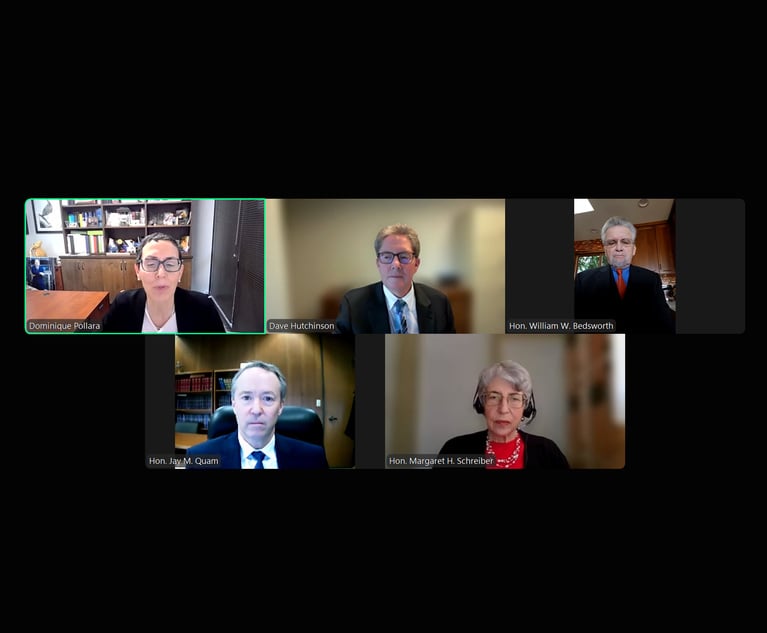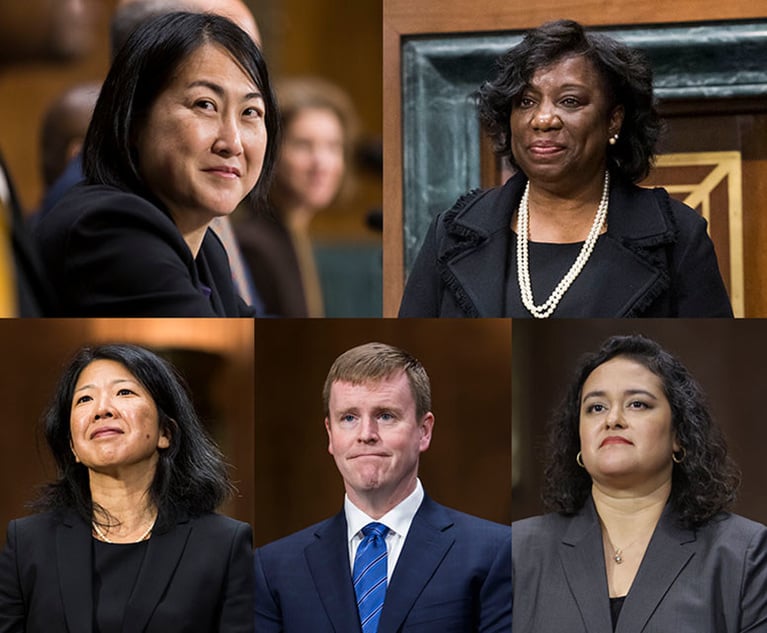USC to Pay $240M to Settle Sex Abuse Claims Over Campus Gynecologist
Under a claims process administered by a special master, victims could get $2,500 to $250,000 each.
October 19, 2018 at 02:41 PM
5 minute read
 University of Southern California.
University of Southern California.
The University of Southern California has agreed to pay $240 million to settle sexual abuse claims by potentially tens of thousands of women involving its former campus gynecologist.
The settlement, announced on Friday, comes in a consolidated class action in federal court against USC and Dr. George Tyndall, the campus gynecologist for more than two decades. The plaintiffs, most of whom sued anonymously, claim Tyndall made inappropriate remarks and performed unnecessary procedures on female students. The suits allege that USC knew about the complaints but did nothing about them.
The agreement, which has to be approved by a federal judge, sets up a claims process administered by a special master.
“This proposed settlement not only brings meaningful relief to this class of USC graduates and students, but stands as a testament both to the strength of these women, coming forward to tell their truth, and to the ability of class actions to create real positive impact for those who have suffered,” lead plaintiffs attorney Steve Berman said in a statement. “We are pleased that this proposed settlement will bring meaningful recovery to this class of women, without intensive litigation and discovery directed at the victims, and provides a relatively simple process to have their cases evaluated by a special master.”
In a statement, USC, represented by Quinn, Emanuel, Urquhart & Sullivan's Shon Morgan, valued the settlement at $215 million when excluding attorney fees. The school said tuition or donor funds would not pay for the fund, which, apart from “certain administrative costs,” would go entirely to class members. Any “residual balance” of the fund would be “contributed to charitable organizations that benefit women's health and well-being.”
“Our board of trustees supports this settlement, which was reached in collaboration with plaintiffs' counsel, and which will provide relief to those who have been impacted by this difficult experience,” wrote USC interim president Wanda Austin. “By doing so, we hope that we can help our community move collectively toward reconciliation. I regret that any student ever felt uncomfortable, unsafe, or mistreated in any way as a result of the actions of a university employee.”
USC's former president, C.L. Max Nikias, resigned earlier this year amid the Tyndall scandal.
Newly elected USC board chairman Rick Caruso also issued a statement, noting that the trustees have begun a “cultural shift” that includes forming a new Office of Professionalism and Ethics and completing an independent investigation into its student health center.
“While we cannot change the past, it is my sincere hope that this timely settlement provides some measure of relief to those impacted and their families,” he wrote.
Tyndall's lawyer, Denise Taylor of Taylor DeMarco in Los Angeles, did not respond to a request for comment.
The lawsuits followed an expose by the Los Angeles Times that uncovered the Tyndall abuse complaints. The settlement comes as The Rockefeller University Hospital is investigating claims that a former doctor sexually abused his patients, who were children with growth problems (Debevoise & Plimpton is representing the hospital). It also comes as lawyers, amid the #MeToo movement, have increasingly filed class actions over sex abuse and harassment—claims traditionally brought as individual cases.
Plaintiffs in the USC suits claim that Tyndall used his fingers to penetrate their vaginas, ordered them to strip completely nude and groped their breasts. In earlier years, he also video-recorded exams. The suits also say school administrators refused to act on numerous complaints about the doctor that began in 2000 and that staff at the clinic, some of whom were in the exam rooms, said nothing about his behavior. Additionally, the suit notes that Tyndall targeted Chinese students and made inappropriate sexual comments.
USC suspended Tyndall in 2016 following an investigation by its Office of Equity and Diversity but also reached a financial settlement with him.
The settlement offers three tiers of claims. Tier 1 claimants would receive checks for $2,500 each. Those are for a claimant “who can be identified through existing health center records, or who submits credible evidence of being a patient of Dr. Tyndall at the USC student health center for the period from July 14, 1997, through June 21, 2016,” according to a release by Berman's firm, Hagens Berman Sobol Shapiro.
A special master would review claims in Tier 2 and Tier 3. Those tiers would require women to describe their experience and its impact on them, with claims in Tier 2 ranging from $7,500 to $20,000 for actions that “fall outside the scope of accepted medical standards of care,” and Tier 3 offering up to $250,000. Tier 3 claims would require a forensic psychologist or other expert to interview the women, and the special master could consider damages “based on an assessment of the emotional distress and/or bodily injury to the claimant.”
USC and Tyndall face more than 60 lawsuits by 400 women. Some lawyers, however, have filed individual cases in Los Angeles Superior Court, and it's unclear whether those would be part of the settlement.
This content has been archived. It is available through our partners, LexisNexis® and Bloomberg Law.
To view this content, please continue to their sites.
Not a Lexis Subscriber?
Subscribe Now
Not a Bloomberg Law Subscriber?
Subscribe Now
NOT FOR REPRINT
© 2024 ALM Global, LLC, All Rights Reserved. Request academic re-use from www.copyright.com. All other uses, submit a request to [email protected]. For more information visit Asset & Logo Licensing.
You Might Like
View All
'Serious Disruptions'?: Federal Courts Brace for Government Shutdown Threat
3 minute read
‘It's Your Funeral’: On Avoiding Damaging Your Client’s Case With Uncivil Behavior

Practice Tips From—and About—the New Judges on the Northern District of California Bench

Trending Stories
- 1Phila. Jury Awards $15M to Woman Who Slipped on Apartment Building Stairs
- 2Appellate Division Greenlights State Bar's Leadership Diversity Initiatives
- 3SEC’s Latest Enforcement Actions Fuel Demand for Big Law
- 4Sterlington Brings On Former Office Leader From Ashurst
- 5DOJ Takes on Largest NFT Scheme That Points to Larger Trend
Who Got The Work
Michael G. Bongiorno, Andrew Scott Dulberg and Elizabeth E. Driscoll from Wilmer Cutler Pickering Hale and Dorr have stepped in to represent Symbotic Inc., an A.I.-enabled technology platform that focuses on increasing supply chain efficiency, and other defendants in a pending shareholder derivative lawsuit. The case, filed Oct. 2 in Massachusetts District Court by the Brown Law Firm on behalf of Stephen Austen, accuses certain officers and directors of misleading investors in regard to Symbotic's potential for margin growth by failing to disclose that the company was not equipped to timely deploy its systems or manage expenses through project delays. The case, assigned to U.S. District Judge Nathaniel M. Gorton, is 1:24-cv-12522, Austen v. Cohen et al.
Who Got The Work
Edmund Polubinski and Marie Killmond of Davis Polk & Wardwell have entered appearances for data platform software development company MongoDB and other defendants in a pending shareholder derivative lawsuit. The action, filed Oct. 7 in New York Southern District Court by the Brown Law Firm, accuses the company's directors and/or officers of falsely expressing confidence in the company’s restructuring of its sales incentive plan and downplaying the severity of decreases in its upfront commitments. The case is 1:24-cv-07594, Roy v. Ittycheria et al.
Who Got The Work
Amy O. Bruchs and Kurt F. Ellison of Michael Best & Friedrich have entered appearances for Epic Systems Corp. in a pending employment discrimination lawsuit. The suit was filed Sept. 7 in Wisconsin Western District Court by Levine Eisberner LLC and Siri & Glimstad on behalf of a project manager who claims that he was wrongfully terminated after applying for a religious exemption to the defendant's COVID-19 vaccine mandate. The case, assigned to U.S. Magistrate Judge Anita Marie Boor, is 3:24-cv-00630, Secker, Nathan v. Epic Systems Corporation.
Who Got The Work
David X. Sullivan, Thomas J. Finn and Gregory A. Hall from McCarter & English have entered appearances for Sunrun Installation Services in a pending civil rights lawsuit. The complaint was filed Sept. 4 in Connecticut District Court by attorney Robert M. Berke on behalf of former employee George Edward Steins, who was arrested and charged with employing an unregistered home improvement salesperson. The complaint alleges that had Sunrun informed the Connecticut Department of Consumer Protection that the plaintiff's employment had ended in 2017 and that he no longer held Sunrun's home improvement contractor license, he would not have been hit with charges, which were dismissed in May 2024. The case, assigned to U.S. District Judge Jeffrey A. Meyer, is 3:24-cv-01423, Steins v. Sunrun, Inc. et al.
Who Got The Work
Greenberg Traurig shareholder Joshua L. Raskin has entered an appearance for boohoo.com UK Ltd. in a pending patent infringement lawsuit. The suit, filed Sept. 3 in Texas Eastern District Court by Rozier Hardt McDonough on behalf of Alto Dynamics, asserts five patents related to an online shopping platform. The case, assigned to U.S. District Judge Rodney Gilstrap, is 2:24-cv-00719, Alto Dynamics, LLC v. boohoo.com UK Limited.
Featured Firms
Law Offices of Gary Martin Hays & Associates, P.C.
(470) 294-1674
Law Offices of Mark E. Salomone
(857) 444-6468
Smith & Hassler
(713) 739-1250






